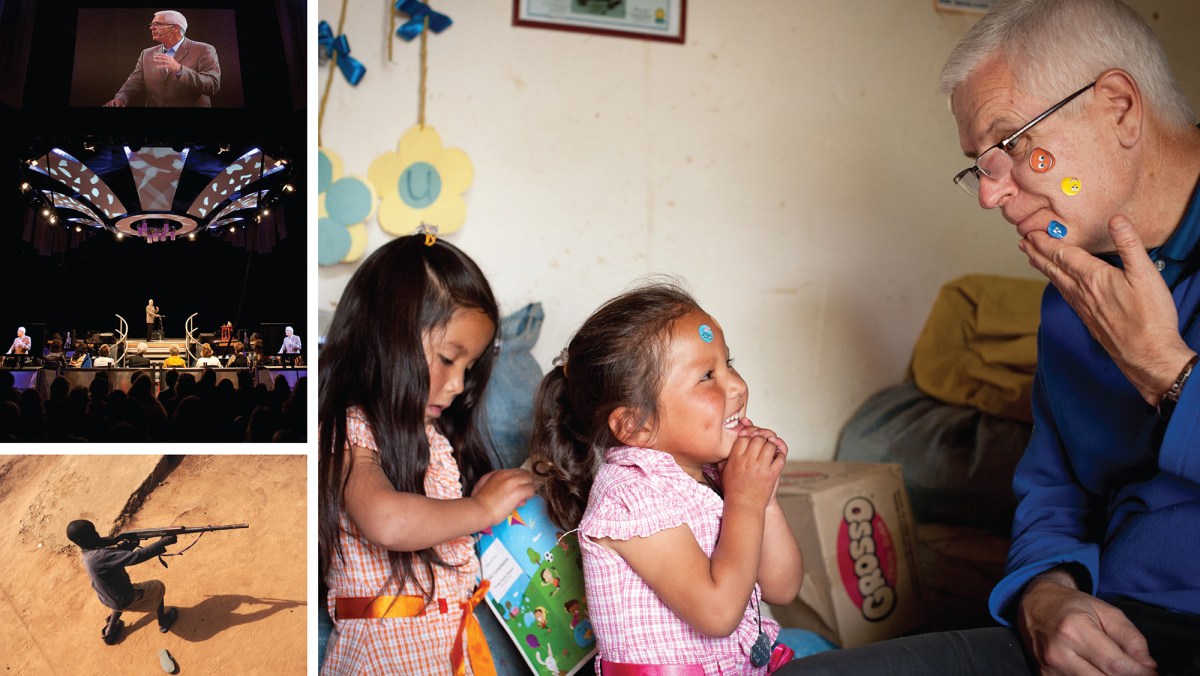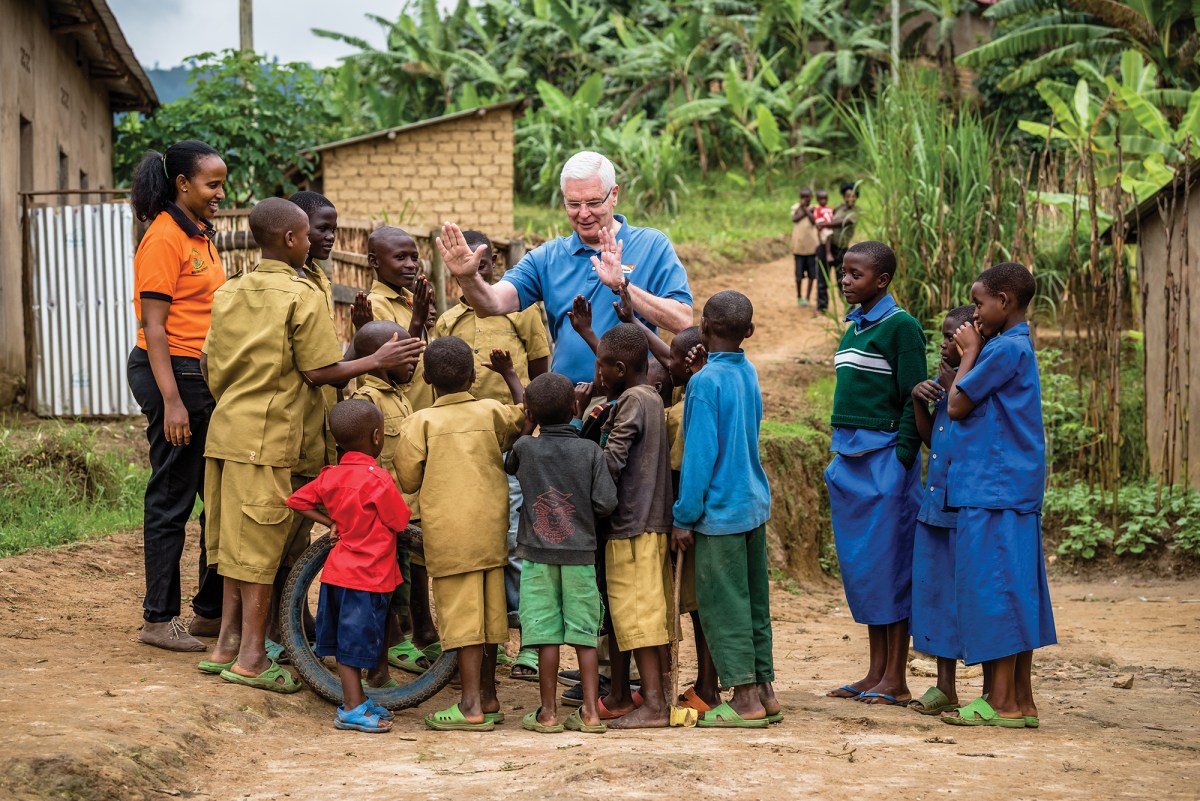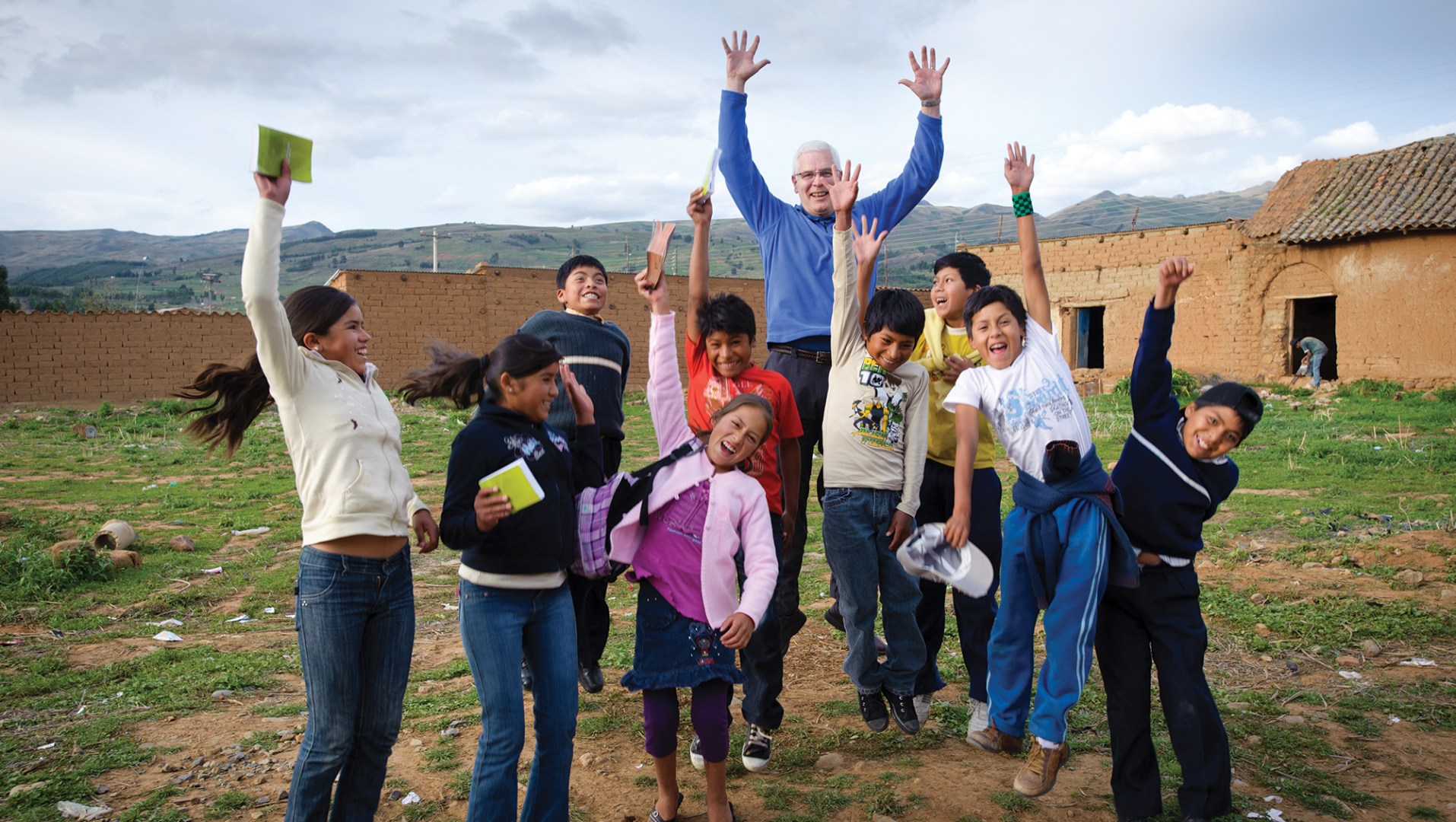You’ve grown World Vision US from $350 million to $1 billion over your two decades as president and CEO. Today 40,000 international staff serve children in 100 countries, and you just visited Rwanda to launch a five-year plan to make it the first developing nation with universal access to clean water. Why retire now?
I believe that everything has a season. Like Moses with the staff in his hand, I brought what I had to offer World Vision and made it available to the Lord. I’ve had a wonderful season here, but I don’t want to be that guy the board is whispering about: “When’s the old boy going to leave? Isn’t it about time?” I’m 67. It’s time for World Vision to have a fresh vision and a new leader who has new things to offer.

When World Vision first courted you, you said it was looking for a leader who was “part CEO, part Mother Teresa, and part Indiana Jones.” Is that who you’ve become?
I think to some extent [yes]. The Mother Teresa part is you got to have a big heart for the poor and a passion for the least of these. The CEO part is it’s a billion-dollar organization, and it’s more complex today than when I started. And the Indiana Jones part is sometimes you find yourself in places like South Sudan surrounded by AK-47s. You’ve got to have a certain amount of adventuresome-ness in your bones to do that travel and enter into the world’s heartbreak.
What are some of your proudest accomplishments?
AIDS, refugees, and WASH [water, sanitation, and hygiene] have all been major passions of mine. When tackling the HIV/AIDS crisis in the early 2000s, my marketing VP said, “We’re a G-rated ministry, and this is an R-rated issue. Christians will never give to this.” And I said, “Well, then they’re wrong. We’re going to try to make the case to the church that we need to care for widows and orphans in their distress.” Today, refugees are a similar issue. They are not popular for American Christians to support or churches to embrace. But this is one of the biggest things happening in the world—involving 15 million refugees and displaced people from Syria and Iraq—and for the American church to be on the sidelines is unacceptable. On WASH, we went from being a tertiary player in the field to No. 1 in the world. We now bring clean water to three to four million people a year. And that took a lot of effort, a lot of fundraising, and a lot of technical expertise.
One of the things I’ve learned about leadership is a leader has to read the times. You look at the world, and there’s no shortage of crises. But none of us has the resources to throw ourselves into every one of them. And you can only take so many messages to your donors. So you’ve got to discern which of these things—for our organization, at this moment—do we draw ourselves into.
Support for refugees became heavily politicized during the 2016 election. How do you advocate when many supporters view it through a partisan lens?
That’s always a challenge, no matter who’s in the White House—and World Vision goes back to [President Harry] Truman. So from Truman to [President Donald] Trump, there have always been people in the White House who sometimes align with Christian values and sometimes don’t. And every president’s job description is to keep America great and to put America first, right? So I tell church leaders, “We need to let the government be the government. But we need to make sure the church stays the church.” God doesn’t love American children any more than he loves the children of South Sudan or the children of Syria.
So the prophetic voice in the Old Testament was always used to bring people back to the plumb line of God’s truth and God’s righteousness. When you read a passage like Zechariah 7:9 [“Administer true justice; show mercy and compassion to one another.”], those words seem very contemporary right now. So you have to be willing to take up unpopular causes. There are always going to be areas of conflict between what our government wants to do and what God would have us do.
What lessons from the success of your AIDS advocacy do you think apply to refugee advocacy?
A lot of it is lack of information. I have found that when the facts are presented, Christians tend to do the right thing. They’re generous. With AIDS, I used to say we’re not going to deal with the issue of sexual immorality. Our message is going to be biblical. “Pure religion is this: to care for widows and orphans in their distress” [paraphrasing James 1:27]. And it worked. People saw the crisis through a whole new lens.
Now with refugees, there’s fear. There’s stigma. There’s Islam. There’s a manmade crisis. So I tell pastors I’m going to give them three reasons why their church needs to care about refugees. And I’ll say, “Reason No. 1: They’re all people made in the image of God who Christ died for. Do you need a second reason?” And I go on and say, “Reason No. 2: This is a once-in-a-lifetime opportunity to demonstrate the love of Christ in the Muslim world, to show them what the gospel is really all about in very tangible ways. Do we want to miss that opportunity?” And then I’ll say, “Reason No. 3: The indigenous churches in the Middle East are overwhelmed with refugees, and they’re crying out for help. Don’t we want to help our brothers and sisters where Christianity is rapidly diminishing be the church? Let’s be their supply line.” And then most pastors say, “How can we help?” We’ve raised tens of millions of dollars for refugees in the United States. Not as much as we did with AIDS—it’s still an uphill battle—but we’ve been able to make a difference.
Do you look forward to the freedom to be more prophetic once you retire?
Actually one of the things I’m looking forward to is not getting embroiled in so many controversial issues. It’s hard enough to help the poor—to just do the basic job that we’re trying to accomplish, helping poor children realize their full God-given potential. But then you have to navigate extremely difficult issues—culturally, theologically, and politically. You mention the politics of the United States. Well, we work in 100 countries. So we have to navigate the politics of South Sudan, of Kenya, of Rwanda, of the Congo, and it’s really quite challenging. So I won’t miss a lot of that. But I hope to still be a prophetic voice on things that are close to my heart.
What did you learn from your controversial 2014 policy change, reversed within 48 hours, on hiring employees in same-sex marriages?
This was probably the biggest leadership mistake and lesson of my 43-year career. We were trying to unite Christians across multiple denominations that disagree on that issue in order to serve the poor in the name of Christ, and I naively thought we could avoid this division. The leadership lesson I learned is the importance of a leader being willing to say, “I made a mistake. I apologize. Would you forgive me?” I did a living room tour, where I’d go to different cities and we’d gather 10 to 40 pastors and I would apologize and then take their questions. It took about six months. And what I found is just about everybody I talked to was willing to forgive.
You identified “the hole in our gospel” in your 2009 book. During your decades at World Vision, has that hole gotten smaller for the American church?
It’s a continual struggle. Giving to international causes has never fully recovered from the recession, while every other giving category has. Right now we’re in a “take care of America” mode. However, what disturbs me is to some extent we’ve lost a sense of the Great Commission. A Barna Group study recently found that half of American Christians don’t even know what it is. Well, that’s pretty unsettling because, as I argued in my 2013 book Unfinished, the Great Commission was essentially the one task that Christ gave his church to do. And when you put it together with the Great Commandment to love our neighbor as ourselves, it’s almost like God has put a big gold arrow on the planet saying, “Go here, because this is where the least of these live.” Two-thirds of the aggregate population of the world’s 50 poorest countries are non-Christian. So the Great Commission is pointing us to the very same countries as the Great Commandment. It’s like a treasure map saying, “Dig here.”
What mementos will you take home from your office?
This mosaic is the Arabic letter n, for Nazarene. This was given to me in Erbil, in Kurdistan in Iraq, by Christian refugees from Mosul. ISIS had spray-painted this letter on their home, to mark where the Christians lived for looting and assault. The woman told me, “For us as followers of Christ, this is our cross. This is why the symbol is so important to us.” So this inspires me. This reminds me every day that there’s a refugee woman living in a trailer right now who once a week for a couple of hours comes together with other middle-class ladies who look like my wife’s home Bible study, but they’ve lost everything. And they’ve got a story to tell. So I keep going to the field not because the local staff need me to tell them what to do, but because I need my heart broken again. I need to hear their stories. I need the fuel for my passion when I come back.
 Jon Warren / World Vision
Jon Warren / World VisionWhat goals will you have to leave unfinished?
In this kind of job, there’s always more to be done. Poverty and injustice are part of the human condition. There’s always going to be something to do for my successor, and their successor, and their successor until the Lord returns. You have to get used to the fact that you can’t help everybody. If you dwell on the human suffering that you can’t prevent or address, you will burn out. You will be so heartbroken that you just can’t face it another day. But if every day focuses on accomplishments—look at the people we were able to help today—if you live in that positive space, then every day is a celebration.
American presidents leave a note in their Oval Office desk with advice for their successor. What would you write to Edgar Sandoval, who starts October 1?
I made a list. No. 1: Keep your eyes on Jesus, because you’re going to be thrust into turmoil and controversy and geopolitics, and you really have to keep your anchor, your north star. Pray for clarity to see what God sees.
No. 2: Surround yourself with committed Christian leaders, and give them permission to speak the truth to you. Don’t believe your own press clippings. I used to say the wonderful thing about World Vision was nobody could name its president. One of the reasons I need to leave is people are starting to know my name. You don’t want World Vision to be known for its leader; you want it to be known for its work and effectiveness.
No. 3: Let your heart be broken. You need to go out and meet the people and sit in their tents or huts and cry with them. And then you got to come back and tell people what you’ve seen and what you’ve learned.
Finally, never believe that it all depends on you. We see through a glass darkly, but God is working. He’s using your failures and your mistakes, and he’s bringing a harvest that you can’t even imagine. Last summer, I went to Kenya and met a 54-year-old sponsored child. Jackson was an orphan who was sponsored in 1974 by a family that probably said, “Well, we can’t solve global poverty, but we can help one little boy.” In 2016, Jackson Ole Sapit was named the sixth archbishop of the Anglican Church of Kenya. We were just trying to feed some hungry kids; God was growing an archbishop. There’s a famous Mother Teresa quote: “God has not called me to be successful. He has called me to be faithful.” And that’s important to remember when you’re dealing with problems that seem hopeless. We just have to be faithful with what is in front of us—to do the best we can and trust God for the outcome.
Jeremy Weber is deputy managing editor of Christianity Today.
Learn something new from this interview? Did we miss something? Let us know here.












